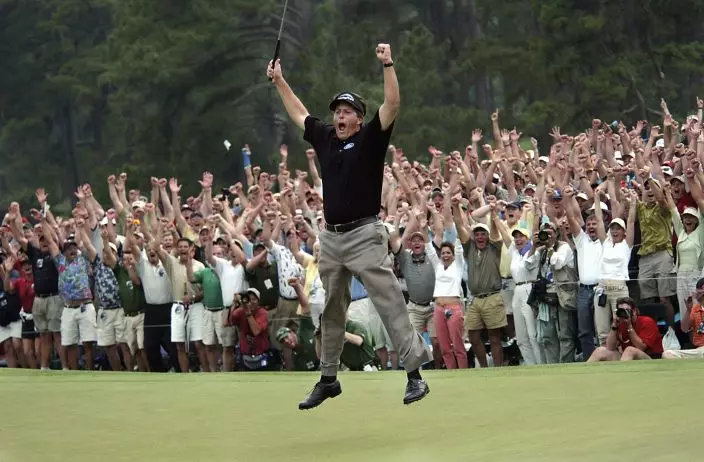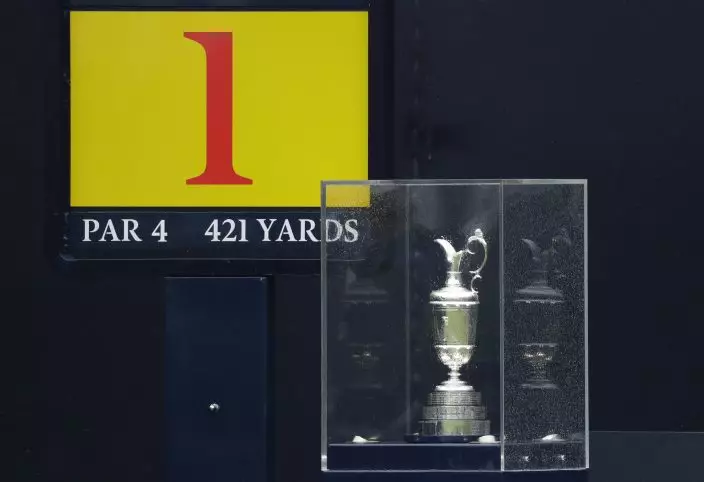It was probably just coincidence that Nevada’s governor issued an order closing golf courses just a few hours after a newspaper photographer tweeted a picture of O.J. Simpson playing 18 holes in Las Vegas.
Simpson himself seemed resigned to it, tweeting in a video later that extraordinary times call for extraordinary measures.
“This is serious ... people are losing their lives,” he said.

FILE - In this April 11, 2004, file photo, Phil Mickelson celebrates after winning the Masters golf tournament at the Augusta National Golf Club in Augusta, Ga. When Augusta comes up, one instantly thinks of the Masters. At least the Masters still has hope of being held at some point this year. The College World Series in Omaha, Nebraska and the Women's College World Series in Oklahoma City have already been wiped from the 2020 calendar. (AP PhotoDave Martin, File)
Before Gov. Steve Sisolak acted on Wednesday, the idea of people playing golf during the pandemic was already being debated on social media. There was predictable outrage among some, who said golfers were flouting social distancing guidelines by playing in foursomes even if they weren’t allowed to share a golf cart.
Then again, it might have just been the optics of people out enjoying themselves on the golf course that set off people hearing about it from inside their homes.
So on the day the Masters was supposed to open, golf courses around the Silver State were being closed. Restrictions on other businesses were tightened and churches were being told not to allow people to gather on Easter Sunday as the state clamped down further on social distancing.

FILE - In this Sunday, July 21, 2019 file photo protected by a glass case the famous Claret Jug stands on the 1st tee the British Open Golf Championships at Royal Portrush in Northern Ireland. The organizers of the British Open announced Monday April 6, 2020, that they have decided to cancel the event in 2020 due to the current Covid-19 pandemic and that the Championship will next be played at Royal St George's in 2021. (AP PhotoMatt Dunham)
Golf courses were closed on the same day in hard hit New York, too, after golf was labeled a non-essential business. And in Texas, the governor told local leaders in a conference call that golf courses were not essential and would have to be shut down.
The recreation debate is one that is playing out across the nation. It’s not just golf, of course, with gyms closed everywhere and almost every activity or sport long since shut down.
Hikers complain so many people are flocking to trails that it is impossible to maintain distancing guidelines. In neighborhoods around the country, people are out walking and jogging — and trying their best not to run into others out doing the same thing.
We’ve been stuck at home for what already seems like forever. And as the days grow warmer and the outdoors more inviting, no one has any idea when we’ll be able to resume the activities that we once used to take for granted.
Not surprisingly, the golf industry wants that to happen sooner rather than later.
The National Golf Foundation, which tallies golf numbers, said 24.2 million people played golf in 2018, and another 9.3 million people hit balls at a range or participated in some other form of the sport. The numbers were up slightly from the year before despite the fact course closings outnumbered course openings, as they have every year since 2006.
At the end of last week, though, the NGF said 56 percent of the nearly 17,000 golf courses in the United States were closed because of coronavirus, a number that will grow even more as closures in states like New York, Nevada and Texas are added to the list.
Interestingly, the closures varied widely across the country, with 82 percent of courses in Texas remaining open last week compared to just 16 percent in the Great Lakes states. More courses remained open in rural areas than in parts of the country with concentrated populations, the NGF said.
The industry group put out some other findings, including 67 percent of those ages 18-34 that it surveyed believed — at least late last week — that courses should remain open, while 55 percent of those 65 and older supported the closings.
Personally, I don’t have a problem with golf courses still being open for play, though with restrictions that would likely mean most golfers would take a pass. The biggest would be no golf carts, meaning golfers would have to play the game the way it was originally meant to be played — walking the course with their own clubs.
It would also mean no cart person plying beer and snacks every few holes, but that’s another debate all by itself.
Golf has served as a nice diversion to some during the current crisis, offering those who enjoy the sport some competition, fresh air and a few hours outside to forget about their troubles. But it’s hard to defend golf as an essential business, especially when many see it as an elitist sport to begin with.
We’re in the battle of our lives, and in a battle to save lives. That means making sacrifices every day, including a lot of things we used to take for granted.
And, really, it’s pretty simple. If the Masters can wait, so can your next round.
Tim Dahlberg is a national sports columnist for The Associated Press. Write to him at tdahlberg@ap.org or http://twitter.com/timdahlberg


